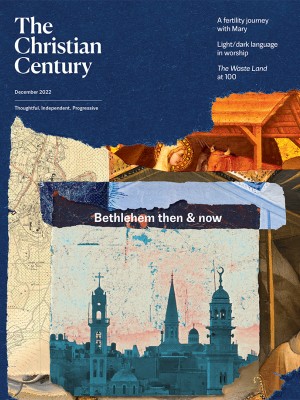The feeling I no longer pray for
One of the reasons I left my childhood faith tradition is that I didn’t feel what I was supposed to feel.

Every so often, I pull out my old prayer journals and look for patterns or trajectories. What have I prayed for consistently? What requests have I stopped making? How have I approached God differently over time?
I skimmed a few journals recently and made a discovery that surprised me: over the past couple of years, I’ve stopped asking to feel God’s presence. This is surprising because I spent years begging God to show up in palpable ways. I grew up in a faith tradition that put a lot of stock in this sort of experience. Most of my early prayers were for sacred sensation: God’s arms around me, God’s face shining down on me, God’s power thrilling me. For years, my litmus test for a mature faith was affective: Did I feel God in my everyday life? Did I sense God’s love, feel God’s forgiveness, experience God’s joy?
One of the reasons I left my childhood tradition is that I didn’t feel what I was supposed to feel. At least, not often, and not in ways I could depend on. Though I prayed fervently for felt experiences of God, such experiences by and large eluded me. (Hence the pages of tear-stained ink in my journals.) Predictably, this led to guilt, shame, doubt, and jealousy. Surely, I thought, I was doing something wrong. Surely I didn’t have enough faith.
Read our latest issue or browse back issues.
Looking back now, I see that my problem wasn’t faulty spiritual circuitry but rather an impoverished conception of God. For much of my life, my sense of what counts as a spiritual experience was too small.
Like many people raised in the church, I learned to approach God in exclusively anthropomorphic terms. God as parent, friend, teacher, lover. Of course, these metaphors are in the Bible for a reason; they’re beautiful and true, and they offer us rich possibilities for prayer and practice. But they have their limitations, too. They can prime us to approach God in the same ways we approach each other, as if God’s relational and emotional range looks just like ours. As if God comes and goes, offers and withholds, embraces and withdraws just as we do.
What I’ve learned in recent years is to change my default setting from divine absence to divine presence—to assume that every experience I have is a spiritual one. After all, if God is wholly other; if God is not a bigger, stronger, smarter version of me; if God infuses and simultaneously transcends all that exists—then what does it mean to feel God? If God is not a being among other beings but instead the ground of all being, how does my understanding of spiritual experience have to expand?
The desperate prayers I scrawled in my journals for years assumed a loving God who was “out there.” A God who cared but held back, waiting for me to ask, seek, and knock hard enough to earn an emotional baptism, a mountaintop experience, a mystical encounter.
But that is not the God of scripture. The God of scripture is present in all things and in all places—even in the pain of God’s seeming absence, even in the very human experiences of spiritual yearning and grief. The God of scripture simply is, ever present and ever close. The God of scripture broods over the waters, lingers in the garden, paints the sky with rainbows, and sets desert bushes on fire. The God of scripture whispers and thunders, teases and teaches, obscures and reveals, convicts and comforts, weeps and laughs, dances and feasts. The God of scripture is fire, cloud, wine, bread, lion, lamb, lord, servant, midwife, bridegroom. The God of scripture frolics with the leviathan, commands the waves, writes in the dust, grieves at a graveside, dies on a cross, and makes breakfast on a beach at dawn.
“Where can I go from your spirit?” asks the psalmist. “Or where can I flee from your presence? If I ascend to heaven, you are there; if I make my bed in Sheol, you are there” (Ps. 139:7–8).
But if the psalmist’s claim is true, then why do so many of us struggle to feel God? To trust that God is always with us, closer than breath?
I wonder if it’s because we compartmentalize our lives, walling God off from arenas we consider too secular and ordinary. Most of us have an easy time perceiving God in our gratitude, our awe, our reverence, our delight. But what if God is just as present in our boredom, our irritation, our hunger, and our fury? What if God dwells as richly in the laundry room, the cafeteria, the schoolyard, and the boardroom as God does in the pews, the sermon, the chalice, and the baptismal font?
There is nowhere I can go where God is not. There is no experience I can have apart from the one in whom I live and move and have my being. I don’t need to beg God to make my everyday experiences spiritual; I am already surrounded, held, infused, and animated by the God who made me.
This is not to say I’ll never ask for mountaintop encounters again. Only that I’m learning to experience God’s presence in all things—even in God’s apparent absence. Even in the hunger that causes me to yearn, ask, seek, and knock. God is fully present in the absence and the hunger, just as God is fully present in the communion and the feast.
* * * * * *
Jon Mathieu, the Century's community engagement editor, engages Debie Thomas in conversation about her article.







